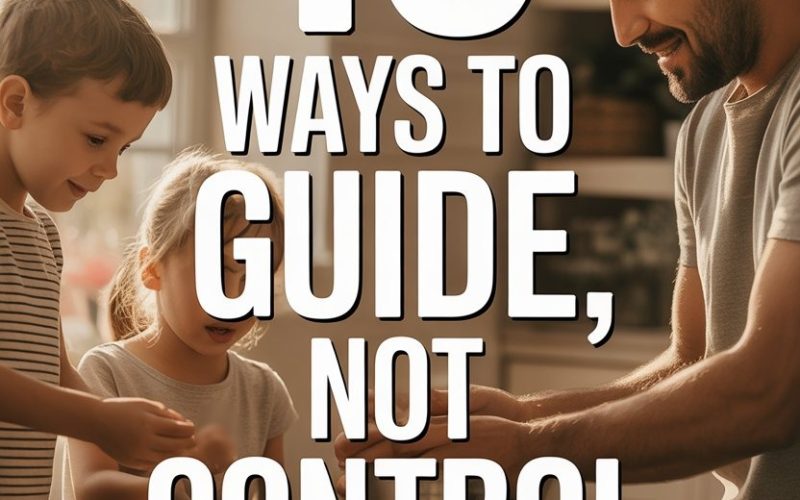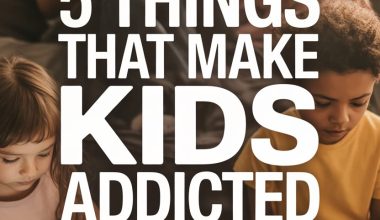Ever feel like parenting is mostly just trying to steer a cruise ship with a teaspoon? Welcome to the club!
Every tired, loving parent has wondered if they’re guiding their kids or just wrestling their willpower into submission.
The line between helpful guidance and full-on puppet-mastery can get fuzzy—especially when you’re staring down a preschooler with a death grip on a biscuit and a will to match Churchill’s.
If you’re looking for practical ways to support your children without running the family like a dictatorship (complete with bedtime coups), here are ten strategies for guiding, not controlling, your kids—even on those days when you’d rather just go hide in the loo for a bit of peace.
1. Listen Like You Mean It
Real listening isn’t just about catching every word. Kids know when you’re only half there—probably because you’re scrolling through emails or mentally reheating last night’s curry for dinner.
Put the device down, look them in the eye, and really tune in, even if the story involves a magical dinosaur and a suspiciously familiar “Mum voice.”
Researchers at Harvard suggest that meaningful parent-child conversations help kids feel truly heard, which in turn builds self-worth and trust.
2. Ask More, Tell Less
“Do you want to wear your red jumper or blue?” beats “Put your jumper on” every time. It’s easy to slip into boss-mode when you’re on a schedule, but giving choices (even small ones) hands kids a bit of power over their own lives.
Choices let them practice decision-making in a safe zone—without the risk of someone choosing ice cream for lunch (well, not every day, anyway).
3. Explain the Why (Without a TED Talk)
“Because I said so” may have worked on us, but it usually falls flat now. Kids aren’t born knowing why they shouldn’t chuck peas at their sister or stick crayons up their nostrils.
A quick explanation (“We don’t draw on the walls because it’s hard to clean off, and we want the house to look nice”) shows them respect and helps them internalise your values, according to child development research.
No need to deliver a dissertation—keep it short and sweet.
4. Set Boundaries, Not Barbed Wire
Boundaries are like bumpers at the bowling alley: they keep things on track without squashing all the fun. Clear rules provide safety and structure, but if they’re too strict, kids just find sneakier ways to get around them.
Consistent, fair boundaries offer comfort, not just constraint. When your little one knows what’s expected (and what happens if they test the limits), the drama levels tend to drop.
5. Admit When You’re Wrong (Yes, Really)
Parenting comes with more U-turns than a sat nav in a roadworks zone. If you snap, forget something, or make a mistake, say so.
Apologising shows your child that everyone gets it wrong and that it’s okay to own up and move forward. Kids learn more about humility and accountability from your “oops” moments than your “I told you so” ones.
6. Let Natural Consequences Do Some of the Work
Nothing teaches a child faster than natural consequences—like soggy socks from skipping their wellies. Micromanaging every moment robs your child of the valuable lesson that their choices matter.
If it’s safe, let the lesson land. Forgot the lunchbox? They’ll survive until afternoon tea (and probably remember tomorrow). Obviously, don’t let them play chicken with actual danger, but try to let the universe do some of the heavy lifting.
7. Show, Don’t Just Tell
Children have the keenest hypocrisy radar known to man. If you preach kindness but mutter curses at slow drivers, they’ll notice. Model the behaviour you want to see: patience at the checkout, honesty when something goes wrong, empathy when someone’s upset.
Monkey see, monkey do—sometimes literally, if you’ve ever seen a toddler copy your expressions at a family gathering.
8. Encourage Independence—Even If It Takes Five Times Longer
It’s tempting to just tie the shoes, zip the coat, or fix the snack because you could do it twice as fast (and with 90% less spillage). But giving kids space to try, fail, and try again builds confidence and capability.
A study in Pediatrics found that kids who develop self-care skills early tend to be more self-assured later on. Yes, it means you’ll be late sometimes. But watching them master new skills is worth the odd puddle of juice.
9. Validate Their Big (and Small) Feelings
From the outside, a meltdown over mismatched socks seems dramatic. Inside your child’s brain, though, it’s a Category Five storm. When you acknowledge their feelings—“That sock really is scratchy, isn’t it?”—kids learn that emotions aren’t scary or shameful.
Validation doesn’t mean agreeing with every outburst, but it turns you into a safe harbour when life feels overwhelming. Sometimes, all they need is a cuddle and a bit of empathy before they’re ready to compromise.
10. Cheer Their Effort, Not Just the Outcome
Everyone loves a shiny trophy, but endless praise for “winning” sets up a perfection trap. Highlighting effort—“You worked really hard on that drawing!”—encourages kids to keep trying, even when things don’t go their way.
Psychologist Carol Dweck’s research on growth mindset shows that focusing on process, not just results, helps kids tackle challenges with grit instead of giving up at the first hurdle.
Guiding with Love (and Sometimes, a Bit of Chocolate)
Guiding your kids isn’t about controlling every step—they’ll learn more from your trust than your orders. Letting go of the urge to direct every move can feel risky, but it’s the surest way to raise kids who know how to steer their own ships.
Some days, you’ll ace it. Other days, you’ll wonder if they’ve learned anything besides how to hide vegetables in the radiator.
That’s alright—parenting is as much about the journey as the destination.
And if all else fails, there’s always chocolate. Just don’t expect to eat it alone.




